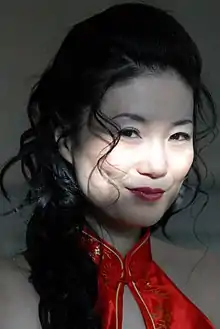Lulu Wang (novelist)
Lulu Wang (Chinese: 王露露; pinyin: Wáng Lùlù; born 22 December 1960) is a Chinese-born writer who has lived in the Netherlands since 1986. She is a best-selling novelist and also a columnist for Shijie Bolan (World Vision).
Lulu Wang | |
|---|---|
 Lulu Wang in 2007 | |
| Native name | 王露露 (Wáng Lùlù) |
| Born | 22 December 1960 Beijing, China |
| Occupation | Writer, teacher |
| Alma mater | Peking University |
| Years active | 1997–present |
| Website | |
| www | |
Early life
Lulu Wang was born on 22 December 1960 in Beijing, China. Her mother was a teacher of literature. At Peking University, Wang studied subjects including English language and literature.[1] After graduation, she taught at the university before moving to the Netherlands in 1986, at the age of 26;[2] there she taught Chinese at the Zuyd University of Applied Sciences in Maastricht.[1]
Writing career
In 1997, she published her semi-autobiographical debut novel, Het Lelietheater ("The Lily Theatre"),[2] which is strewn with Chinese-language proverbs and rhymes translated into Dutch.[3] The novel sold over 800,000 copies in the Netherlands and earned her the Gouden Ezelsoor in 1998 for the bestselling literary debut work;[4] the following year, it won an International Nonino Prize at the Salzburg Easter Festival.[5][6] In 1997, she was noted to be the best-selling Dutch-language author.[7] The novel has been translated from Dutch into several languages, including English.[8][9]
"For a while, her name was virtually the only one an average Dutch reader could produce when asked to name a Chinese writer."[10]
Her 2010 novel, Wilde rozen is, like her debut, a book based on her life in China; this time, the main character is twelve-year-old Qiangwei, who grows up during the Cultural Revolution. Wang called it her most personal book yet.[11] In 2012, she published Nederland, wo ai ni, a book app containing animations, music, and a discussion forum, also available as an e-book; it was later published in a printed version as well. A second book app was published in 2013, Zomervolliefde, a bilingual Dutch and Chinese publication including poems, illustrations, a song, and a short movie.
In addition to being a best-selling author,[12] Wang works as a columnist for the international Chinese-language magazines World Vision (Chinese: 世界博览, pinyin: Shìjiè Bólǎn)[13] and World Affairs (Chinese: 世界知识, pinyin: Shìjiè Zhīshì).[14]
Awards
- Gouden Ezelsoor (1998)[4]
- International Nonino Prize (1999)[15] at the Salzburg Easter Festival[5][6]
Selected works
- (1997) Het lelietheater (The Lily Theater)
- (1998) Brief aan mijn lezers (Letter To My Readers)
- (1999) Het tedere kind (The Tender Child)
- (2001) Het Witte Feest (The White Party)
- (2001) Seringendroom (Lilac Dream)
- (2002) Het Rode Feest (The Red Party)
- (2004) Bedwelmd (Intoxicated)
- (2007) Heldere Maan (Bright Moon)
- (2010) Wilde rozen (Wild Roses)
- (2010) Lotusvingers (Lotus Fingers)
- (2012) Nederland, wo ai ni (Netherlands, Wo Ai Ni)
- (2013) Zomervolliefde (Summer Full Love)
- (2014) Adam en Eva in China (Adam and Eva in China)
- (2015) Levenlangverliefd (Life Long in Love /情燃毕生)
References
- Yue, Tao (Spring 2007). "Fiction is philosophy: interview with Lulu Wang" (PDF). IIAS Newsletter. Archived from the original (PDF) on 31 January 2015. Retrieved 31 January 2015.
- T'Sjoen 2004, p. 20.
- Howell & Taylor 2003, p. 161.
- (in Dutch) Gouden Ezelsoor, Grafische Cultuurstichting. Retrieved on 8 March 2015.
- (in Italian) I Premiati del Quarantesimo Premio Nonino Archived 2015-02-27 at the Wayback Machine, Nonino. Retrieved on 8 March 2015.
- (in Italian) Il Premio Nonino per Salisburgo alla scrittrice cinese Lulu Wang, Corriere della Sera, 1999. Retrieved on 8 March 2015.
- Louwerse 2007, p. 125.
- https://www.worldcat.org/identities/lccn-n97-108571/
- "DNB|115627944".
- Idema 2013, p. 202.
- Post, Hans Maarten (20 August 2010). "Lulu Wang keert terug naar haar jeugd". Het Nieuwsblad (in Dutch). Retrieved 30 January 2015.
- Schwartz, John Burnham (September 10, 2000). "Mao's Summer Camp". The New York Times. Retrieved 31 January 2015.
- "Lulu Wang". Meuse Rhine Journal. Maastricht. 9 July 2013. Archived from the original on 2 April 2015. Retrieved 31 January 2015.
- (in Dutch) Jeroen Gijselhart, "Nieuwe reeks: Lulu Wang over haar cultuurshock in Nederland", If then is now, 2013. Retrieved on 11 March 2015.
- Paridon, Elsbeth van (April 1, 2014). "Cultural ambassador Lulu Wang". China.org.cn. Retrieved 31 January 2015.
Bibliography
- Howell, Robert B.; Taylor, Jolanda Vanderwal (1 January 2003). History in Dutch Studies. University Press of America. ISBN 978-0-7618-2567-8.
- Idema, Wilt L. (11 December 2013). Chinese Studies in the Netherlands: Past, Present and Future. BRILL. ISBN 978-90-04-26312-3.
- Louwerse, Henriette (2007). Homeless Entertainment: On Hafid Bouazza's Literary Writing. Peter Lang. ISBN 978-3-03911-333-0.
- T'Sjoen, Yves (2004). De zwaartekracht overwonnen : dossier over 'allochtone' literatuur. Academia Press. ISBN 978-90-382-0692-9.
- Weststeijn, Willem G. (1 January 1999). Dutch Contributions 1998, Literature. Rodopi. ISBN 90-420-0715-X.